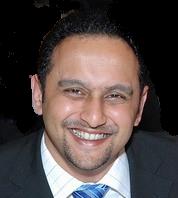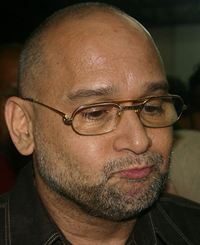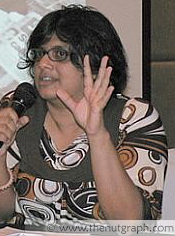By Gan Pei Ling | 18 August 2010 | The Nut Graph
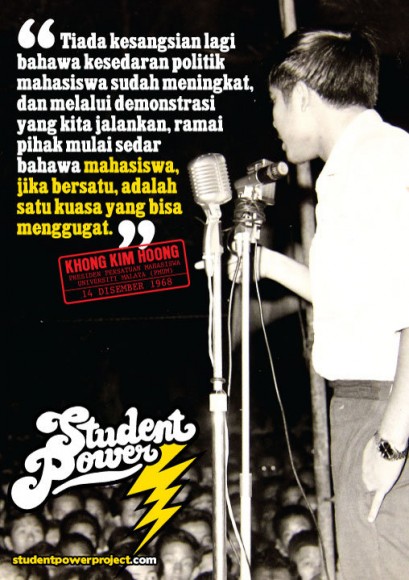
Poster featuring picture of and quote from Khong (All images courtesy of Fahmi Reza except where otherwise noted)
DR
Khong Kim Hoong studied economics in
Universiti Malaya (UM) from 1966 to 1969. He was elected as deputy president of the University of Malaya Students’ Union (Umsu) in his second year, and was made president for the 1968-1969 term.
During the 1969 general election, he was one of the student leaders who toured 13 cities and towns in Peninsular Malaysia to publicise the students’ manifesto among the rakyat. The manifesto demanded basic rights including minimum wage for workers, equal rights in education and healthcare, and the abolition of laws like the Internal Security Act (ISA), which allows for indefinite state detention without trial.
Khong won the Best All-Round Student gold medal award from UM despite his involvement in student union work. After his graduation, the university awarded Khong a scholarship to study political science and international relations in the US. There, he continued his student activism by joining
Students for a Democratic Society. He became a lecturer in UM after he returned to Malaysia, where he served for 16 years.
Upon leaving UM, Khong joined HELP University College and is now its senior vice-president. He spoke to
The Nut Graph about his days as a student activist in UM in the 1960s, at his office in Kuala Lumpur on 23 July 2010.
TNG: How did you get involved in the student movement?
Khong Kim Hoong: I think my first experience in student activism was joining a protest on Autonomy Day. You may not have heard of it. Basically we were fighting for university autonomy – the right of the university to admit students based on merit.
What happened was, in 1964 the government amended the law [so that] all students entering university and higher learning institutions [were required] to get a
Suitability Certificate from the
Home Affairs Ministry. You could only be admitted into the university if you obtained the certificate.
When Singapore was still part of Malaysia, there was a lot of student activism in
Nanyang University (it merged with the University of Singapore to form the National University of Singapore in 1980). So the government wanted to prevent a similar phenomenon in other parts of Malaysia. [But] even after Singapore separated from Malaysia, those draconian laws remained.
When I was a [first-year student] in 1966, UM was the only university in Malaysia, and Umsu organised a protest against what it considered as discrimination against students’ activism. That was my first involvement in the student movement.
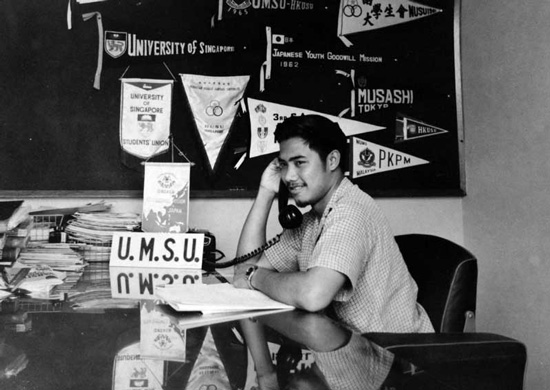
Khong at the Union House as a student activist
No tear gas. The demonstration was confined to campus. I’m sure there were police personnel around, but there were no police in uniform. The students marched around campus, and then had a big meeting in the great hall [where] various people spoke.
Then I became more interested in student activism [because I think] students must contribute to society as they have benefited from education.
What did you have to do to get the certificate?
You had to fill up a form and submit it together with your application form to join the university. I suppose the university in turn sent the form to the Home Affairs Ministry for approval.
So how would the ministry know if you were a “radical person”? Just based on the form?
I’m sure the Special Branch already had the information. The law was just a formality so that [they had a valid excuse] to prevent people they considered “radicals” from entering university. They only abolished the law much later.
What were some of the main issues that Umsu championed when you were deputy president and later president?
Human rights and university autonomy were the key issues. Lots of people were detained under the
ISA in the 1960s; some were students, others were politicians and human rights activists – we demanded for the release of all political detainees.
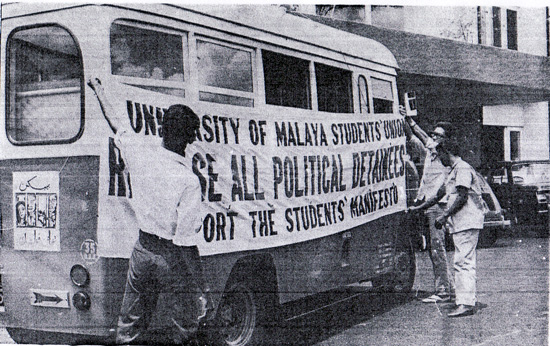
Calling for the release of political detainees
Landlessness and poverty were also causes championed by the students. Basically some squatters in Teluk Gong were removed from their homes. The government destroyed their houses and crops but did not relocate them, so they became homeless overnight.
The students then held a big protest at the then Selangor state secretariat building, near the present Selangor Club padang. We also collected money to help them out. I remember getting them straw mats for them to sleep on, and buying food for them. There were weekly protest meetings and discussions at the speaker’s corner in front of the (UM) library, too.
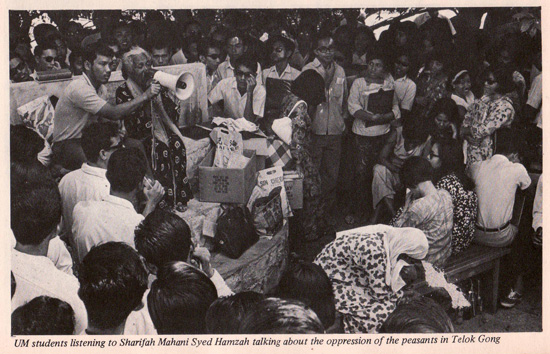
Demonstration in Teluk Gong, 1967
There always seemed to be so much to do. We had to study, and at the same time, there were a lot of political and social activities as well as welfare work that was going on.
The campus was alive with discussions on social, political and economic issues. It was quite common to have politicians from different parties come in to talk and debate.
Regularly?
Yes, we had open discussions and invited people from the government, opposition, business industries, social movements, community groups, etc. to come. Some booing, jeering and cheering went on all the time when the talks and debates were held, [but there were no incidents at all]. The university was an open forum for ideas, which is what it should be. People disagreed, but there was respect for one another’s views and opinions.
Did you face any obstacles from the university or government when organising talks or protests?
Sometimes the university authorities may not have been supportive, but they allowed us to do whatever we wanted. The student union was independent, so we did not have to get permission or consult the university to organise activities.
Let’s say the Economic Society wanted to organise a forum. All they had to do was book the hall, stating the purpose. There was no need to submit any
names of speakers or things like that.
What about the government?
I’m sure the government knew what went on. The Special Branch must have had its [informants] and its members among the students, though we did not know who they were. It would have been naïve to think that they were not present.
In 1968, when the students protested outside the Russian embassy on Jalan Ampang against the Russian invasion of
Czechoslovakia, the police came with tear gas to break up the demonstration. It was okay when we organised marches or protests on campus, but the government did not allow demonstrations on the streets.
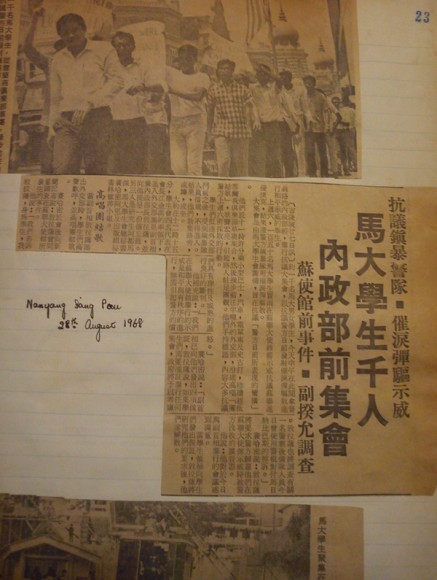
'1,000 students protest against police use of force to break up peaceful demonstration', Nanyang Siang Pau, 28 Aug 1968. Courtesy of Khong Kim Hoong (Click on image for bigger view)
The next day, the students organised a bigger demonstration at the Selangor Club padang to protest against the police for using force to break up a peaceful demonstration. From there, we marched to the Prime Minister (PM)’s office to protest.
This was on the streets. Did the police allow you all to march?
This time the police did not do anything to break up the demonstration. We marched to the PM’s office and had a meeting with Tun (Abdul) Razak, the deputy prime minister (DPM) at that time. A lot of students came out in the protest march.
The DPM promised us the police would not use force in future, but I think in 1969 the police used force again to break up protests against Tunku Abdul Rahman. After the
13 May riots, some of the students considered him a failed leader, so they demonstrated and demanded that he step down. At that time, I had already graduated from UM.
What about the general election in 1969? Why did Umsu decide to take part?
It was the first time Umsu officially took part in the elections. We thought since the students benefited from education, we should contribute to the discussion [about] critical political issues during elections.
We did not [put up] a candidate or support any political party. The students union issued a
manifesto for the elections, and we campaigned on what we thought were the important issues. Landless peasants, political detention … issues that we had been championing all along.
We asked the people to judge their candidates based on our manifesto. We stated at our rallies that the candidates who did not support the manifesto should not be given the vote.
How long did you all have to campaign? Was it during the semester break?
Yes, it was during our vacation. I cannot remember how long the campaign was. In 1969, the campaign period was definitely much longer than at present. Now, it seems as though the government wants to keep it as short as possible to prevent people from campaigning. Then, from nomination to polling – it was more than a month.
We campaigned for less than a month, I think. When we started in Petaling Jaya, only around 1,000 people came. But in Penang, about 15,000 people attended our rally.
In Malacca, the police set up roadblocks to direct people away from the rally site. In Kampar or Teluk Intan, the local authority did not want to give us space to organise the rally, and even tried to lie to us that there were no available venues. We called their bluff, and in anger told them that the rally would be held on the main road. Suddenly, many fields were available.
How do you think your student activism has impacted your life?
I think it made me a humanist. I became much more conscious of sociopolitical issues, especially of abuse of power in the country. There is nothing like being hit to know how much it hurts. We were trying to contribute to debates and discussions on critical issues confronting the nation. But those in power tried [their best] to harass us. Politics is not a gentle game. Those who have vested interests will do their utmost to stay in power.
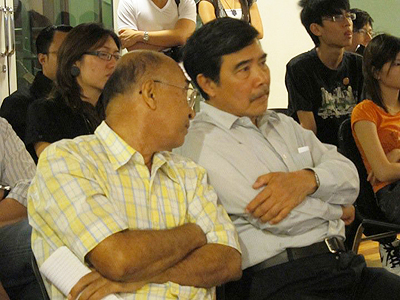
Khong (right) with fellow former student activist Syed Hamid Ali in March 2010
I think social movements operate like a wave. In the 1960s, it slowly went up, and then it went down when the UUCA (Universities and University Colleges Act 1971) was enacted. But it went up again in 1974 during the
Baling protests. Of course, the protests were crushed again, with even more draconian measures, as far as the student movement was concerned. Then, the protests went down. But they will come back again later. It has happened again and again in so many
countries.
I believe it will come up again, at some point. You cannot stop the waves.
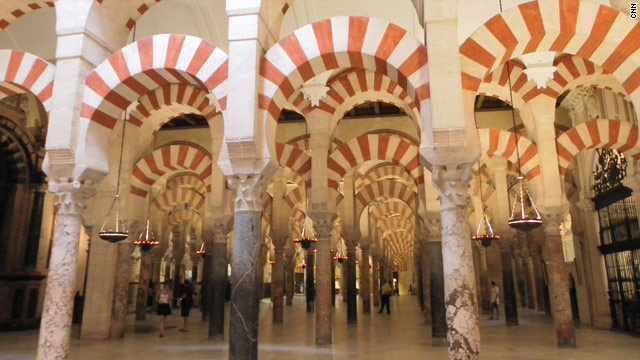



 By Syed Jaymal Zahiid - Free Malaysia Today,
By Syed Jaymal Zahiid - Free Malaysia Today,
 By Maclean Patrick - Free Malaysia Today,
By Maclean Patrick - Free Malaysia Today,
 Deputy Chief Minister Alfred Jabu Numpang has fired a reminder to all: don't accept the bad political culture that the opposition from the peninsula wants to export to Sarawak. This is again a subtle note to all: don't step onto our turf.
Deputy Chief Minister Alfred Jabu Numpang has fired a reminder to all: don't accept the bad political culture that the opposition from the peninsula wants to export to Sarawak. This is again a subtle note to all: don't step onto our turf. By Zefry Dahalan -Free Malaysia Today
By Zefry Dahalan -Free Malaysia Today
 Ravi also attributed the unpopularity of Port Dickson to a lack of local crafts and local foods that could be seen as unique to the area.
Ravi also attributed the unpopularity of Port Dickson to a lack of local crafts and local foods that could be seen as unique to the area.

 Di dalam kelembutannya itu, ada juga ketegasan yang dipaparkan. Pada Mei 7, 2009, Helen bersama-sama 35 orang yang lain ditahan semasa berhimpun dan berpakaian hitam sewaktu punahnya demokrasi di Perak.
Di dalam kelembutannya itu, ada juga ketegasan yang dipaparkan. Pada Mei 7, 2009, Helen bersama-sama 35 orang yang lain ditahan semasa berhimpun dan berpakaian hitam sewaktu punahnya demokrasi di Perak.











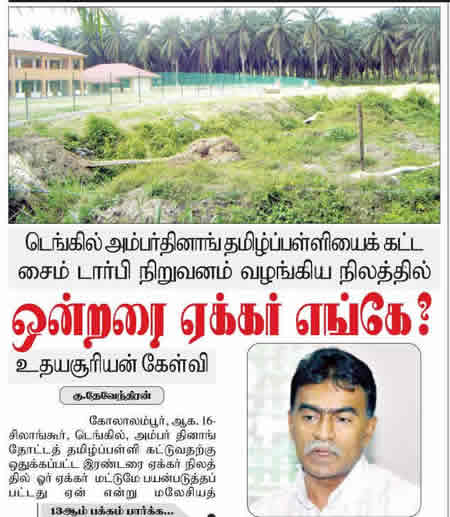
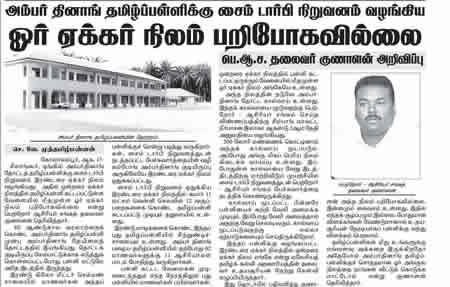
 KUALA LUMPUR, Aug 17 – Datuk Seri Dr Chua Soi Lek said today that he was disappointed with Tan Sri Muhyiddin Yassin for using the May 13 incident to warn the MCA against undermining Barisan Nasional (BN) when fighting for the Chinese community.
KUALA LUMPUR, Aug 17 – Datuk Seri Dr Chua Soi Lek said today that he was disappointed with Tan Sri Muhyiddin Yassin for using the May 13 incident to warn the MCA against undermining Barisan Nasional (BN) when fighting for the Chinese community.



